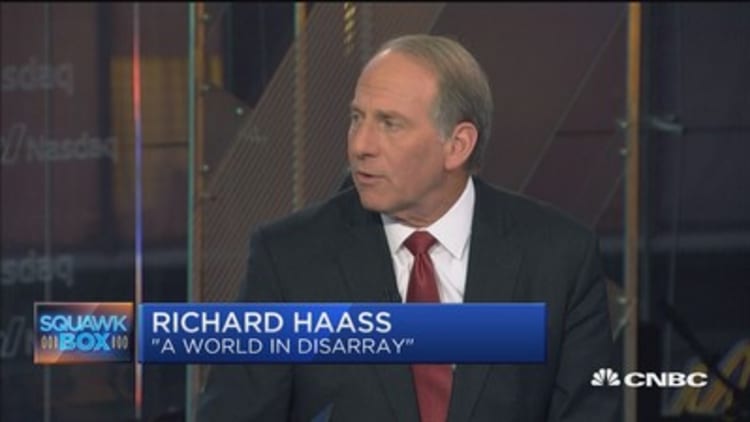
President Donald Trump has pulled out of one trade agreement and has sharply criticized allies. If this continues, the world could sink further into instability, Council on Foreign Relations President Richard Haass warned on Thursday.
"What you don't do can be every bit as consequential as what you do," Haass told CNBC's "Squawk Box." "I worry about the United States doing too little, and I see it already on the trade front."
"It would be the Obamacare equivalent. I worry that we're going to do too much repealing and not enough replacing in the world," he added.
Since taking office, Trump has withdrawn the United States from the Trans-Pacific Partnership and has made plans to renegotiate NAFTA.
Haass, a top State Department official in the George W. Bush administration, said he has spoken with Trump about trade, arguing that it's good for exports, promotes global stability and helps lift countries out of poverty.
"I think his arguments about Japan, about China and so forth are largely wrong. He obviously doesn't agree," Haass said. "That said, I'm not going to say everything about trade is perfect. We do need trade agreements that deal with subsidies by governments. We do need trade agreements that make it impossible to do currency manipulation."
Haass said that with the Middle East and Europe in disarray, China on the rise and nuclear-armed North Korea coming dangerously close to making missiles that can reach the United States, Trump came into office at a difficult time, and must tread carefully.
"The world doesn't sort itself out," Haass said. "There's no invisible hand in the geopolitical marketplace. It doesn't just work. It takes the visible hand of the United States."
And if the president continues to unravel ties with key global partners like China, the United States faces the risk of giving adversaries the opportunity to wreak global havoc, he said.
"I'd be less of a disruptor than Donald Trump. I'd be a little bit more of a preserver. I wouldn't be rattling the U.S.-China relationship. Instead I'd be enlisting China to help us with North Korea. I'd be pushing back against Russia so they're not tempted to do [things] elsewhere in Europe," Haass said.
One of the biggest global shifts Haass said he has noticed is that conflict in a given country, like Syria, is no longer insulated from the rest of the world.
"Nothing is local anymore. You have a mess in Syria, and then suddenly you have a million refugees go into Germany, which totally now has overturned European politics. The nationalist movements, the populist movements, the Brexit vote [were] largely a reaction," he said.
"Whether you're looking at terrorists or hackers or disease or climate change, everything gets on the conveyor belt of globalization," he continued. "That's the problem, in some ways, ... with 'America First.' We need an approach to the world that essentially pushes back against the fact that all over, in every other country, things are happening that could hurt us."


